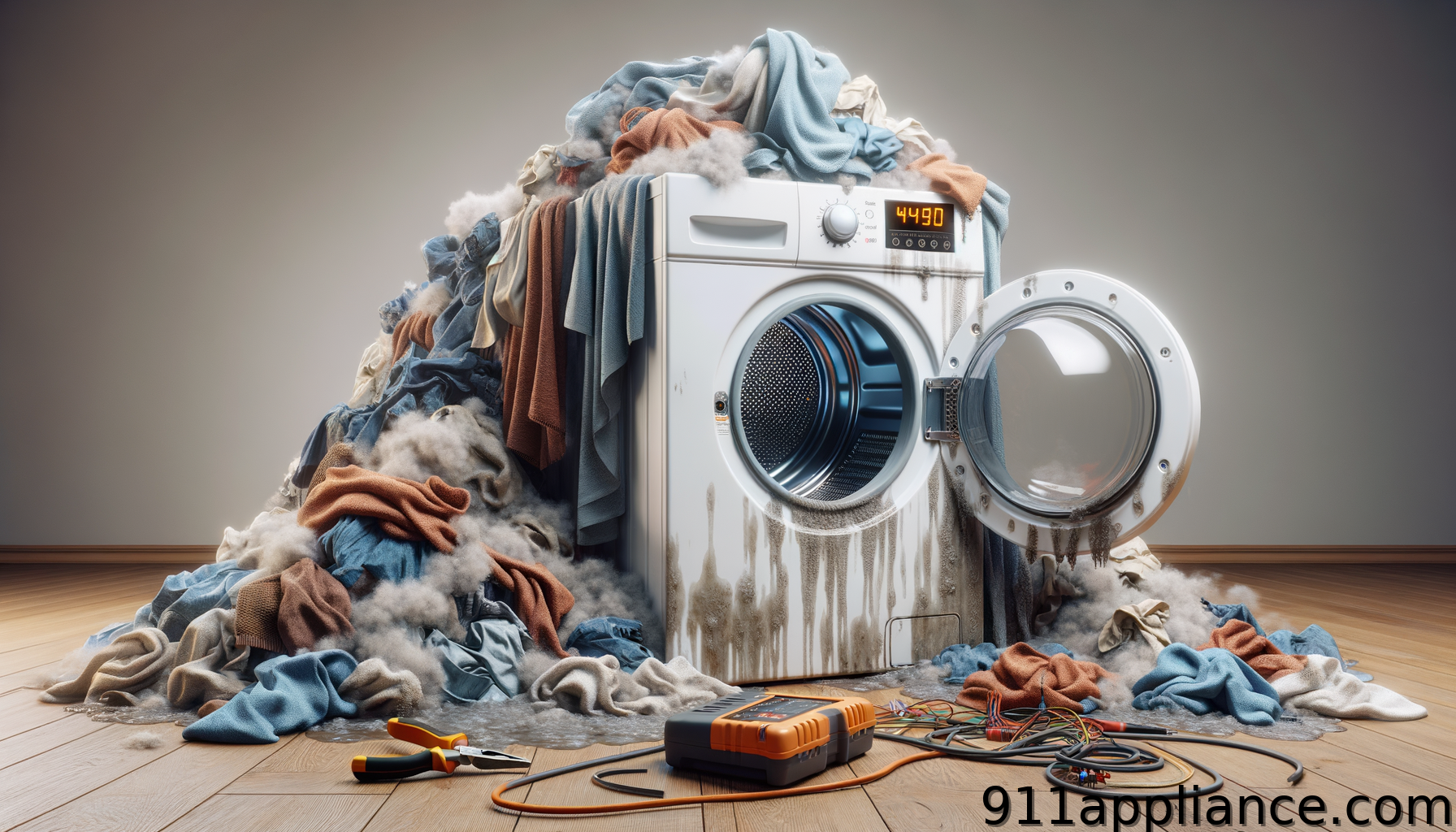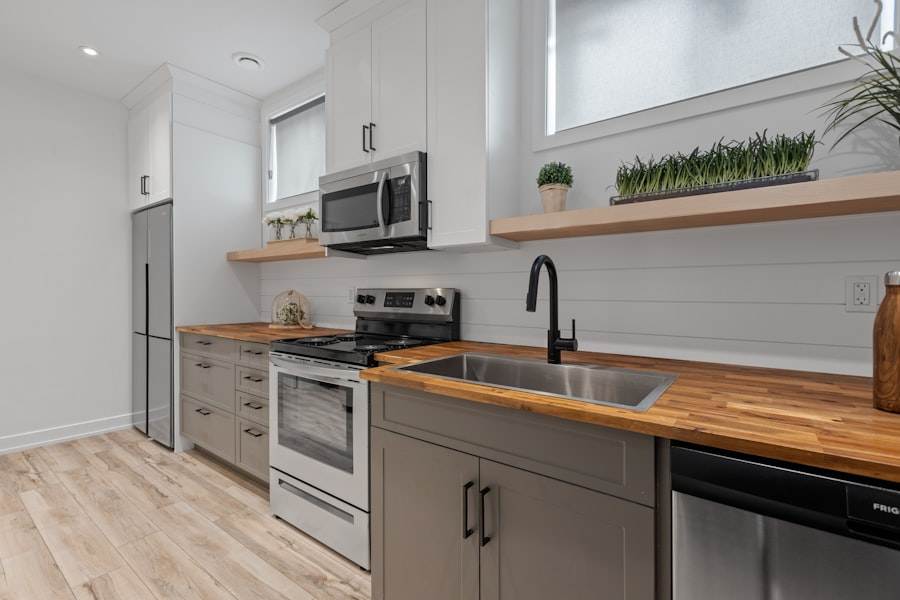Appliances play a crucial role in our daily lives, making our tasks easier and more convenient. From refrigerators and dishwashers to washing machines and air conditioners, these appliances have become an integral part of our homes. However, like any other mechanical device, appliances are prone to malfunctions and breakdowns. This is why regular maintenance and troubleshooting are essential to ensure their optimal performance.
Regular maintenance is necessary to keep appliances running smoothly and efficiently. It helps identify potential issues before they become major problems, saving you time, money, and frustration in the long run. By taking the time to inspect and maintain your appliances, you can extend their lifespan and avoid costly repairs or replacements.
Table of Contents
- Key Takeaways
- Common Issues with Refrigerators and Freezers
- Troubleshooting Tips for Dishwashers
- Common Problems with Washing Machines and Dryers
- Common Oven and Stove Issues
- Common Problems with Microwave Ovens
- Troubleshooting Tips for Air Conditioners
- Common Issues with Water Heaters
- Tips for Preventing Appliance Problems
- What Are Some Solutions to Common Appliance Problems?
- FAQs
- What are common appliance problems?
- What causes appliances to malfunction?
- How can I prevent appliance problems?
- Can I fix appliance problems myself?
- When should I replace an appliance?
Key Takeaways
- Appliance malfunctions can be caused by a variety of factors, including wear and tear, user error, and power surges.
- Refrigerators and freezers commonly experience issues with temperature control, leaks, and strange noises.
- Dishwashers may have problems with drainage, cleaning effectiveness, and detergent dispensing.
- Washing machines and dryers can experience issues with spinning, draining, and heating.
- Oven and stove problems may include uneven heating, faulty burners, and broken knobs.
- Microwave ovens may have issues with heating, sparking, and strange noises.
- Air conditioners may experience problems with cooling, airflow, and strange smells.
- Water heaters may have issues with temperature control, leaks, and sediment buildup.
- Regular maintenance and proper usage can help prevent appliance problems, such as cleaning filters, checking for leaks, and avoiding overloading.
Understanding the Causes of Appliance Malfunctions
Appliance malfunctions can be caused by a variety of factors. Some common causes include wear and tear, lack of maintenance, power surges, faulty wiring, and user error. It is important to identify the root cause of the problem in order to effectively troubleshoot and resolve the issue.
Wear and tear is a common cause of appliance malfunctions. Over time, parts can become worn out or damaged, leading to decreased performance or complete breakdowns. Lack of maintenance can also contribute to appliance problems. Neglecting regular cleaning, lubrication, and inspection can result in clogged filters, dirty coils, or malfunctioning components.
Power surges can also damage appliances. Sudden spikes in electrical current can overload circuits and fry sensitive electronic components. Faulty wiring or improper installation can also lead to appliance malfunctions. It is important to ensure that your appliances are properly grounded and that the electrical connections are secure.
Common Issues with Refrigerators and Freezers
Refrigerators and freezers are essential for keeping our food fresh and safe to consume. However, they can experience a range of problems that can affect their performance. Some common issues include temperature fluctuations, leaks, strange noises, and ice buildup.
Temperature fluctuations can be caused by a variety of factors, such as a faulty thermostat, a malfunctioning compressor, or a blocked air vent. It is important to troubleshoot and resolve these issues promptly to prevent food spoilage.
Leaks are another common problem with refrigerators and freezers. They can be caused by a damaged water line, a clogged drain tube, or a faulty door seal. Leaks can lead to water damage and mold growth, so it is important to address them as soon as possible.
Strange noises coming from your refrigerator or freezer can indicate a problem. These noises can be caused by a malfunctioning fan motor, a worn-out compressor, or loose components. It is important to identify the source of the noise and address it promptly to prevent further damage.
Ice buildup in the freezer can be caused by a variety of factors, such as a faulty defrost timer, a clogged drain tube, or a malfunctioning defrost heater. Ice buildup can restrict airflow and affect the cooling performance of your appliance. Regularly defrosting your freezer and cleaning the drain tube can help prevent this issue.
Troubleshooting Tips for Dishwashers
Dishwashers are designed to make our lives easier by taking care of the dirty dishes. However, they can experience problems that can affect their performance. Some common dishwasher problems include poor cleaning results, leaks, strange noises, and failure to start.
Poor cleaning results can be caused by various factors, such as clogged spray arms, a worn-out pump motor, or hard water deposits. It is important to regularly clean the spray arms and check for any blockages to ensure proper water flow.
Leaks are another common issue with dishwashers. They can be caused by a damaged door seal, a cracked hose, or a faulty pump. Leaks can lead to water damage and mold growth, so it is important to address them promptly.
Strange noises coming from your dishwasher can indicate a problem. These noises can be caused by a malfunctioning motor, a loose pump, or worn-out bearings. It is important to identify the source of the noise and address it promptly to prevent further damage.
If your dishwasher fails to start, it could be due to a faulty door latch, a malfunctioning control panel, or a blown fuse. It is important to check these components and replace them if necessary.
Common Problems with Washing Machines and Dryers
Washing machines and dryers are essential for keeping our clothes clean and fresh. However, they can experience problems that can affect their performance. Some common washing machine problems include failure to drain, excessive vibration, leaks, and strange noises.
Failure to drain can be caused by a clogged drain pump, a faulty drain hose, or a malfunctioning water pump. It is important to check these components and clean or replace them if necessary.
Excessive vibration during the spin cycle can be caused by an unbalanced load, worn-out shock absorbers, or a faulty suspension system. It is important to distribute the load evenly and check the shock absorbers and suspension system for any damage.
Leaks are another common issue with washing machines. They can be caused by a damaged door seal, a cracked hose, or a faulty water inlet valve. Leaks can lead to water damage and mold growth, so it is important to address them promptly.
Strange noises coming from your washing machine or dryer can indicate a problem. These noises can be caused by a worn-out belt, loose components, or a faulty motor. It is important to identify the source of the noise and address it promptly to prevent further damage.
Common Oven and Stove Issues
Ovens and stoves are essential for cooking our meals. However, they can experience problems that can affect their performance. Some common oven and stove problems include uneven heating, failure to heat, gas leaks, and faulty igniters.
Uneven heating in the oven can be caused by a faulty heating element, a malfunctioning thermostat, or a damaged oven sensor. It is important to check these components and replace them if necessary.
If your oven fails to heat, it could be due to a faulty heating element, a blown fuse, or a malfunctioning control board. It is important to check these components and replace them if necessary.
Gas leaks are a serious issue with gas ovens and stoves. They can be caused by a damaged gas line, a faulty gas valve, or loose connections. Gas leaks can be dangerous and should be addressed immediately by a professional.
Faulty igniters can prevent your gas oven or stove from lighting properly. They can be caused by a worn-out igniter, a faulty spark module, or a damaged control board. It is important to check these components and replace them if necessary.
Common Problems with Microwave Ovens
Microwave ovens are convenient for quickly heating up our food. However, they can experience problems that can affect their performance. Some common microwave oven problems include failure to heat, sparking, strange noises, and control panel issues.
If your microwave fails to heat, it could be due to a faulty magnetron, a blown fuse, or a malfunctioning high voltage diode. It is important to check these components and replace them if necessary.
Sparking inside the microwave can be caused by various factors, such as a damaged waveguide cover, a faulty stirrer motor, or metal objects inside the oven. It is important to inspect the waveguide cover and remove any metal objects before using the microwave.
Strange noises coming from your microwave can indicate a problem. These noises can be caused by a malfunctioning turntable motor, a loose fan blade, or a faulty magnetron. It is important to identify the source of the noise and address it promptly to prevent further damage.
Control panel issues can prevent your microwave from functioning properly. They can be caused by a faulty keypad, a malfunctioning control board, or a loose connection. It is important to check these components and replace them if necessary.
Troubleshooting Tips for Air Conditioners
Air conditioners are essential for keeping our homes cool and comfortable during the hot summer months. However, they can experience problems that can affect their performance. Some common air conditioner problems include failure to cool, poor airflow, leaks, and strange noises.
If your air conditioner fails to cool, it could be due to a dirty air filter, a faulty compressor, or a refrigerant leak. It is important to clean or replace the air filter regularly and check the compressor and refrigerant levels.
Poor airflow can be caused by various factors, such as a clogged air filter, a malfunctioning blower motor, or blocked vents. It is important to clean or replace the air filter regularly and check for any blockages in the vents.
Leaks are another common issue with air conditioners. They can be caused by a damaged condensate drain line, a clogged condensate pump, or a faulty evaporator coil. Leaks can lead to water damage and mold growth, so it is important to address them promptly.
Strange noises coming from your air conditioner can indicate a problem. These noises can be caused by a loose fan blade, a faulty motor, or a damaged compressor. It is important to identify the source of the noise and address it promptly to prevent further damage.
Common Issues with Water Heaters
Water heaters are essential for providing hot water in our homes. However, they can experience problems that can affect their performance. Some common water heater problems include failure to heat, leaks, inadequate hot water, and strange noises.
If your water heater fails to heat, it could be due to a faulty heating element, a blown fuse, or a malfunctioning thermostat. It is important to check these components and replace them if necessary.
Leaks are another common issue with water heaters. They can be caused by a damaged pressure relief valve, a faulty drain valve, or a cracked tank. Leaks can lead to water damage and should be addressed promptly.
Inadequate hot water can be caused by various factors, such as a faulty thermostat, a sediment buildup in the tank, or a damaged dip tube. It is important to check these components and clean or replace them if necessary.
Strange noises coming from your water heater can indicate a problem. These noises can be caused by a sediment buildup in the tank, a faulty heating element, or a damaged dip tube. It is important to identify the source of the noise and address it promptly to prevent further damage.
Tips for Preventing Appliance Problems
Preventing appliance problems is essential for ensuring their optimal performance and longevity. Here are some general tips for maintaining appliances:
1. Read the manufacturer’s instructions: Familiarize yourself with the user manual and follow the recommended maintenance procedures.
2. Clean regularly: Clean appliances regularly to remove dirt, dust, and debris that can affect their performance.
3. Check for leaks: Regularly inspect appliances for any signs of leaks and address them promptly.
4. Replace worn-out parts: If you notice any worn-out or damaged parts, such as seals, belts, or filters, replace them immediately.
5. Avoid overloading: Do not overload appliances beyond their recommended capacity as it can strain the motor and cause malfunctions.
6. Use proper cleaning products: Use the recommended cleaning products for each appliance to avoid damaging sensitive components.
7. Schedule regular maintenance: Consider scheduling regular maintenance with a professional technician to ensure that your appliances are in good working condition.
8. Inspect electrical connections: Regularly check the electrical connections of your appliances to ensure they are secure and free from damage.
In conclusion, identifying and preventing appliance problems is crucial for their optimal performance and longevity. Regular maintenance and troubleshooting can help identify potential issues before they become major problems, saving you time, money, and frustration. By following the tips provided in this article, you can ensure that your appliances are well-maintained and functioning properly. Remember to read the manufacturer’s instructions, clean regularly, check for leaks, replace worn-out parts, avoid overloading, use proper cleaning products, schedule regular maintenance, and inspect electrical connections. By taking these steps, you can enjoy the benefits of well-functioning appliances for years to come.
What Are Some Solutions to Common Appliance Problems?
When dealing with common small appliance issues, there are a few solutions that can help. For example, checking the power source and ensuring the appliance is plugged in can often resolve many issues. Cleaning and maintenance can also prevent common small appliance issues from occurring in the first place.
FAQs
What are common appliance problems?
Common appliance problems include malfunctioning motors, faulty thermostats, clogged filters, broken heating elements, and damaged electrical cords.
What causes appliances to malfunction?
Appliances can malfunction due to a variety of reasons, including wear and tear, lack of maintenance, power surges, and electrical issues.
How can I prevent appliance problems?
Regular maintenance and cleaning can help prevent appliance problems. It is also important to use appliances according to their instructions and avoid overloading them.
Can I fix appliance problems myself?
Some appliance problems can be fixed by homeowners, but it is important to have a basic understanding of the appliance and its components. For more complex issues, it is recommended to seek professional help.
When should I replace an appliance?
Appliances should be replaced when they are beyond repair or when the cost of repairs exceeds the cost of a new appliance. It is also recommended to replace appliances that are more than 10 years old.



